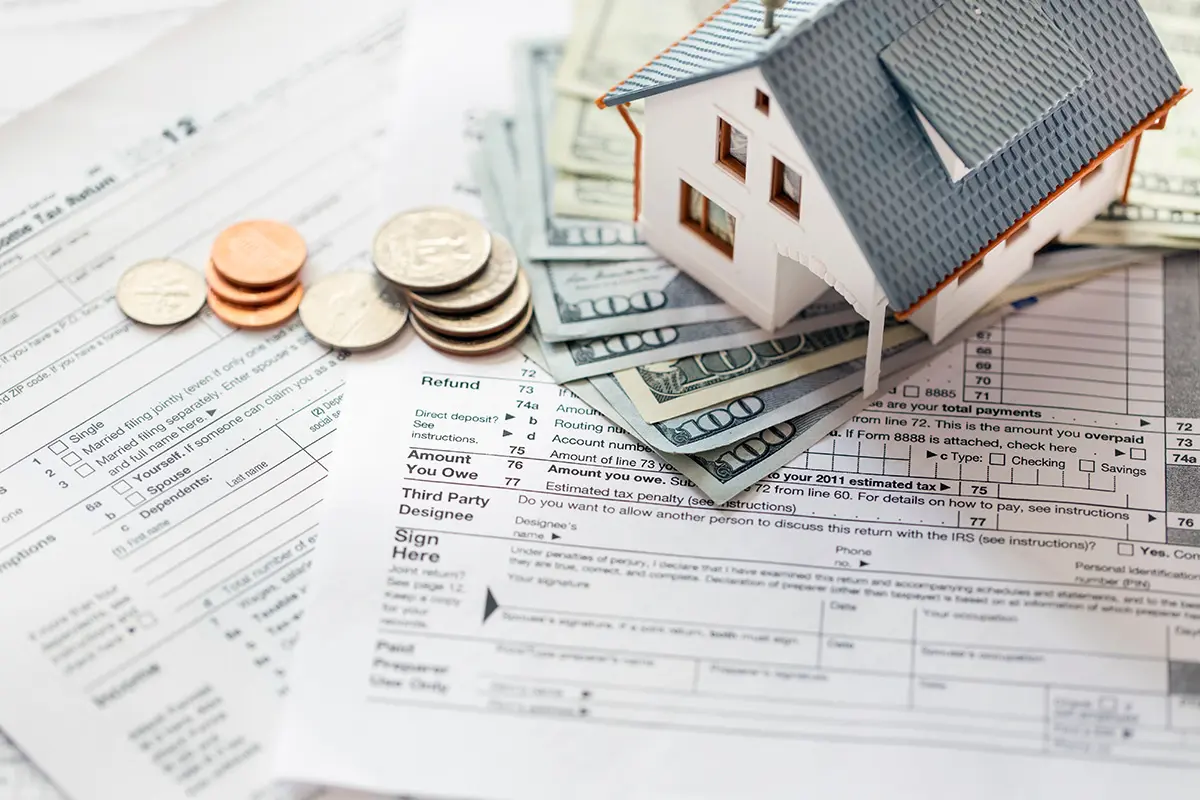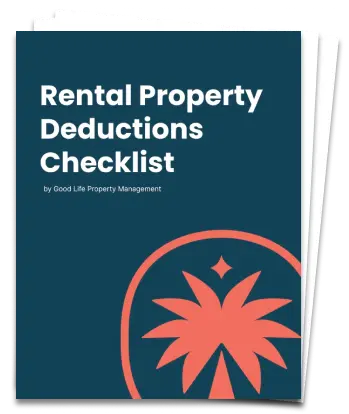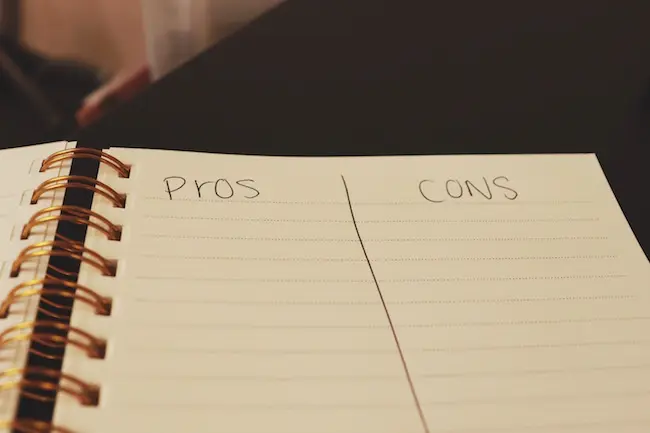Rental Property Deductions Checklist for Landlords
Updated January 31, 2024

Even though landlording is generally considered passive income, there are still expenses landlords can incur while renting out their property. Over time, property management fees, legal fees, and maintenance costs can add up. Fortunately, many of these expenses are tax-deductible, which can help reduce your year-end tax liability.
In order to take advantage of these investment property tax deductions, accurate record-keeping is crucial. By tracking your rental property expenses, you can also identify areas of overspending and opportunities to boost cash flow.
In this article, we’ll take a quick look at how deductions for a rental property work. Then we will review 40 common rental property tax deductions that many property owners overlook. In order to get organized for tax day on April 15, 2024, check out our free downloadable rental property deductions checklist. This will come in handy when filing your taxes.
Table of Contents
- What are rental property tax deductions?
- How do rental property deductions work?
- How is rental income taxed?
- What expenses can I deduct from rental income?
- Rental Property Deductions Checklist: Free Downloadable PDF
- Can you deduct your own labor on rental property?
- Can I deduct remodeling expenses for my rental property?
Disclaimer: The information provided in this article is intended for informational purposes only and should not be considered a substitute for the guidance and expertise of a qualified legal or tax professional. Readers are encouraged to seek professional advice tailored to their specific circumstances before making any legal or tax-related decisions. The content herein is general in nature and may not account for individual variations or changes in applicable laws and regulations.
What are rental property tax deductions?
Rental property tax deductions are expenses associated with owning and managing a rental property. These expenses can be deducted from your taxable income. As a result, these deductions can significantly reduce the amount of income on which you are taxed, and thereby lower your overall tax liability. Typically, rental property tax deductions include the following:
- Mortgage insurance and mortgage interest
- Depreciation of the property’s structure over time
- Repairs and maintenance
- Property management fees
For a more granular list of rental property deductions, check out our rental property deductions checklist below.
How do rental property deductions work?
Rental property deductions allow property owners to offset the financial burden associated with owning and managing their rental property business. When tax season arrives, landlords can deduct various expenses related to their rental property from their taxable income. These deductions will ultimately reduce the amount on which they are required to pay taxes.
Common deductions include mortgage interest, property taxes, operating expenses, and depreciation. Mortgage interest, for instance, can be a deduction that allows property owners to offset the interest paid on their mortgage loans. Operating expenses, such as property management fees, utilities, and maintenance costs, are deductible as well. Additionally, the gradual decrease in the property’s value over time, known as depreciation, is another significant deduction.
Property owners should maintain records of all expenses associated with their rental properties to maximize deductions on their taxes. Our rental property deductions checklist below can help you get organized.
How is rental income taxed?
In addition to rent received, landlords must report all other income received from tenants. For example, if you are a landlord who pays utilities and gets reimbursed by your tenants, then you would declare the utilities as a deductible expense and the utilities reimbursement as income.
On the other hand, security deposits that you intend to give back to your tenant(s) at the end of their lease should not be reported as income. If, however, the security deposit is used as a final payment of rent, it’s considered rent in advance and should be reported as income. Alternatively, if you keep part or all of the security deposit because the tenant caused damages to the property, then the security deposit should be declared as income.
In addition to tracking income, landlords must also track deductible expenses, including: mortgage interest, operating expenses, property tax, depreciation, repairs, etc. To determine your annual taxable income, subtract the total expenses listed in the rental property deductions checklist from the total income received. This calculation will provide the overall income amount to be reported on your Form 1040, Schedule E, Part I.
What expenses can I deduct from rental income?
The IRS allows you to deduct ordinary and necessary expenses related to managing and maintaining your rental property. Ordinary expenses are those commonly and generally accepted in a particular business industry. Necessary expenses, on the other hand, are those deemed appropriate for that business. In the list below, we cover examples of ordinary and necessary expenses for your rental property business.
1. Accounting & Bookkeeping:
Deductible expenses related to professional accounting and bookkeeping services are considered necessary for managing the financial records of the rental property.
2. Advertising & Marketing Costs:
Costs associated with promoting and advertising the rental property to attract tenants, such as online listings, signage, and other marketing efforts are tax deductible.
3. Business Entity Pass-through Deduction:
This includes deductions applicable to certain business entities, allowing a percentage of qualified business income to be deducted from the property owner’s taxable income.
4. Capital Improvement Depreciation:
A capital improvement is the addition of a permanent structural change or the restoration of some aspect of a property that will either prolong the use of life of the property or enhance the property’s overall value. Unlike ordinary repairs and maintenance, which are deductible in the year they’re incurred, capital improvements are depreciated over time, typically across 27.5 years for residential properties (unless a cost segregation is used). For more information on capital improvements, check out the IRS Publication 527.
5. Cell Phone & Internet Services:
Cell phone and internet services related to managing the rental property are tax deductible.
6. Closing Costs:
Costs associated with the acquisition or refinancing of the property, which may include loan origination fees, title insurance, and other related expenses are tax deductible.
7. Credit Card Debt:
Credit card debt directly linked to the ownership and operation of the rental property is tax deductible.
8. Depreciation of the Building:
The gradual wear and tear or depreciation of the building structure can be deducted from taxable income annually. Most residential rental properties depreciate at a rate of 3.636% over 27.5 years. Keep in mind that only the value of buildings can be depreciated. You cannot depreciate the land that your structure is built on. Please refer to IRS Publication 946 for more information about residential property depreciation.
9. Depreciation of Property Classes:
The IRS allows you to depreciate items such as new appliances, carpeting, and furniture over the course of 5 years; office furniture over the course of 7 years; and investments in fences, sidewalks or roads over the course of 15 years.
10. Education:
Deductions for expenses related to educational courses or programs that improve the property owner’s skills in managing rental properties are tax deductible. Common continuing education expenses for landlords include seminars, newsletter subscriptions, books, and/or courses.
11. HOA Fees:
When renting out your property, you can deduct Homeowners Association (HOA) fees.
12. Home Office:
You can deduct expenses related to the use of a designated home office space for managing your rental property business.
13. Independent Contractors and Consultants:
Payments made to independent contractors or consultants providing services related to the rental property are tax deductible.
14. Mold Remediation:
Expenses associated with the removal and remediation of mold issues within the rental property are tax deductible.
15. Mortgage Interest:
Interest paid on the mortgage loan for the rental property is tax deductible.
16. Mortgage Insurance Premium:
Premiums paid for mortgage insurance are tax deductible.
17. Landscaping and Lawn Care:
When it comes to rental property, landscaping and lawn care is considered a business expense and is tax deductible.
18. Landlord Insurance:
Insurance premiums, specifically covering risks associated with rental property, are tax deductible.
19. Leasing:
Costs associated with finding and securing tenants, such as leasing agent fees and advertising expenses are tax deductible.
20. Legal Fees:
Fees paid to legal professionals for services related to the rental property, including eviction proceedings or contract consultations are tax deductible.
21. License and Registration Fees:
Fees for licenses and registrations, such as LLC fees, are tax deductible.
22. Maintenance:
Expenses for routine maintenance and repairs to keep the property in good condition are tax deductible. However, the IRS does not allow you to deduct expenses related to property improvements. For more information on the difference between maintenance and property improvements, check out the tangible property regulations frequently asked questions.
23. Office Supplies:
Costs for office supplies used in managing the rental property, such as paper, ink, and stationery are tax deductible.
24. Pest Control and Extermination Services:
Expenses for controlling and eliminating pests in and around the rental property are tax deductible.
25. Professional Cleaning Fees:
Professional cleaning services for the rental property are tax deductible.
26. Property Management Fees:
Fees paid to property management companies are tax deductible.
27. Property Tax:
Property taxes for the rental property are tax deductible.
28. QBI Pass-Through Deductions:
Rental properties are usually treated as passive income which are generally excluded from Qualified Business Income (QBI). However, rentals that qualify as trades or businesses under IRC § 162 are not considered passive, which means they could potentially qualify for the QBI deduction.
29. Repairs:
Expenses for repairs that maintain the property’s condition, but do not significantly increase its value, are tax deductible. Property improvements that do increase the value of the property are considered capital improvements. While the costs of capital improvements themselves are not tax deductible, the depreciation of capital improvements over time is tax deductible.
30. Sales Tax:
Sales tax on goods and services related to the rental property are tax deductible.
31. Security Systems and Alarms:
Costs associated with the installation and maintenance of security systems and alarms for the rental property are tax deductible.
32. Snow Removal Services:
33. Software Subscriptions:
34. Tax Preparation Fees:
Fees paid to tax professionals for preparing and filing tax returns related to the rental property are tax deductible.
35. Tenant Screening Fees:
Costs associated with screening potential tenants, including background checks and credit reports, are tax deductible.
36. Trash Collection:
Expenses for garbage and waste removal services for the rental property are tax deductible.
37. Local Travel:
Deductions for business-related use of a vehicle, including mileage and maintenance/repairs, to visit your local rental property are tax deductible.
38. Long-distance Travel:
Business-related travel expenses to visit your rental property are tax deductible.
39. Utilities:
Expenses for utilities such as water, gas, electricity, and other services necessary for the property are tax deductible.
40. Vacancy Losses due to Nonpayment of Rent:
Losses incurred during periods of tenant vacancy due to nonpayment of rent are tax deductible.
While this list is not exhaustive, it can help you get an idea of rental property deductions. At the end of each year, you should review your rental property deductions checklist with a qualified tax professional to ensure that you have claimed all rental expenses that are eligible for deduction.

Rental Property Deductions Checklist: Free Downloadable PDF
Fill out the form below to instantly download our rental property deductions checklist.
Can you deduct your own labor on rental property?
The IRS prohibits the deduction of personal labor as a business expense, because you cannot pay yourself with after-tax dollars. However, expenses for repairs, insurance, and maintenance paid to external contractors are eligible for rental property tax deductions.
Can I deduct remodeling expenses for my rental property?
Typically, you deduct the expense of repairing a rental property like any other business cost. However, if the expense enhances the property, restores it, or adapts it to a new purpose, it is considered a capital improvement and should be depreciated. For instance, repairing a small section of a rental house’s roof is treated as a rental expense. However, if the entire roof is replaced, it is considered a capital improvement as it involves restoring the building. In the latter case, the cost of the new roof should be depreciated over time.
Rental Property Deductions Bookkeeping
When claiming rental property deductions, you must separate personal expenses from rental expenses. If you use your rental property for personal purposes, such as a vacation home, then you can only deduct a portion of the cost.
To properly document tax-deductible expenses, keep detailed records, receipts, and invoices that show what you paid and when. If you are selected for an IRS audit, you will need to be able to show the legitimacy of your deductions.
By following these guidelines, you can take advantage of all available rental property deductions from the IRS. We always recommend consulting with a qualified tax professional to make sure you are up-to-date with all new tax laws and regulations for your rental property business.
Hiring a Property Management Company
At Good Life Property Management, we make owning rental property easy. We care about you, your property, and your tenant. And we do it all, so you can Live the Good Life. Schedule a call to learn about how we can add value to your rental property business.
If you found this article helpful, follow us on social media. We post daily tips to help you manage your own rental property:
Resources
Steve Welty
Subscribe to our blog
Share this:
Get in touch with us:
We make owning rental property easy.
Choose Your Next Step
Good Life Blogs
We believe that education is empowering.
Pros and Cons of Hiring a Property Management Company
Read about the pros and cons of using a property management company to manage your rental properties. In this article, we touch on what makes a property management company beneficial but also why some people might be hesitant to hire.
Pros and Cons of Rent Control
The subject of rent control has become increasingly popular over the last couple decades. As rent prices continue to skyrocket across the country, more and more tenants get priced out of their homes and neighborhoods. This is why the majority of tenants are in favor of…
Section 8 in San Diego: How It Works
Rental assistance in San Diego is a hot topic as of late. Many landlords and property managers have heard of Section 8, but don’t know all the ins and outs of the program. As of January 2020, all landlords and property managers are required to accept Section 8 housing vouchers as a form of income…








